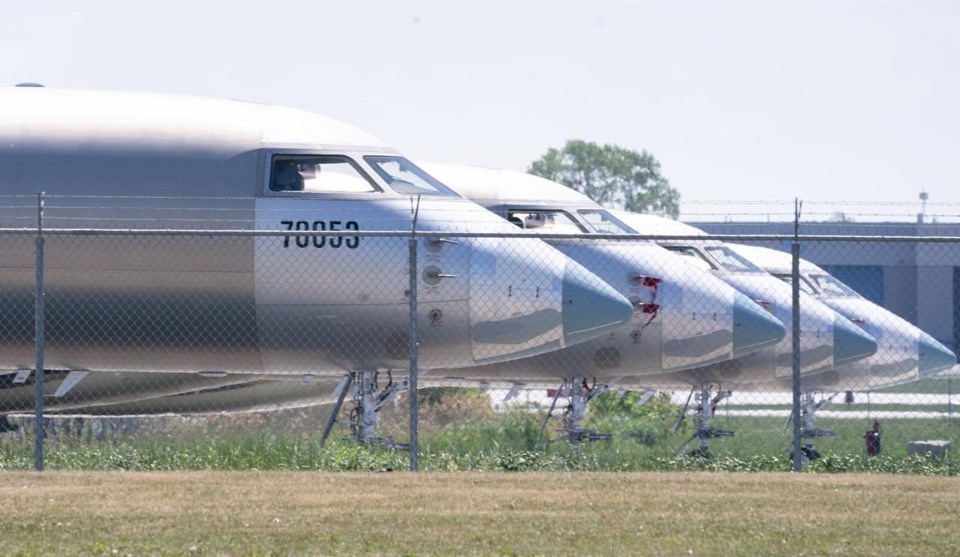MONTREAL — Bombardier Inc. has upped its financial targets for 2025, as the plane maker looks to boost production of business jets amid a growing market.
Bombardier, which keeps its books in U.S. dollars, said Thursday it is now aiming for more than US$9 billion in revenue for 2025, up from about US$7.5 billion.
It also raised its objective for free cash flow to over US$900 million — up from more than US$500 million — a key tool for knocking down its sizable debt pile.
Bombardier aims to make 138 jets this year and 150 in 2025, up from 123 private planes last year.
Despite uncertain economic conditions, chief executive Éric Martel expressed confidence the Montreal-based company's strategy is "on track or ahead of plan."
"There is some added volatility and uncertainty in the markets today," Martel told analysts during a question period at the company's virtual investor day.
"Yes, there’s a bit of turbulence short term, but in the long term ... the fundamentals remain very, very strong," he said.
Cancellations for jet orders are few, though recently there's been some hesitation, Martel added. "Especially with the banking system issue that came up in the past two weeks, of course you can understand that some people would say, 'OK, I’ll wait a couple weeks more.'"
The global business jet market is expected to grow to US$23.7 billion by 2028 from US$18.4 billion last year, according to a new report from market research firm IMARC Group.
Increased flight delays and cancellations and wariness of potential COVID exposure combined with surging wealth among the ultrarich have all helped drive demand for private aircraft.
Martel said COVID-19 served as an "accelerator" for interest in private air travel, but the increased demand has outlasted the pandemic.
"I know sometimes we have the perception that it's only glamorous people flying on this. But I can tell you I know a lot of CEOs or chairmen or company boards where this is the only way they can get around and manage their business, because they have a worldwide presence and they need to be able to move fast and be in three cities and three different companies in the same week," he said.
"They use their airplane as an office."
Commercial airlines captured just 80 per cent of premium travel in 2021, down from 90 per cent before the pandemic, according to Alton Aviation Consultancy managing director Umang Gupta, indicating private travel now accounts for a larger slice of the market.
Bombardier boosted its order backlog by 38 per cent to US$14.8 billion last year from US$10.7 billion in 2020.
Since selling off its remaining stake in the Airbus A220 jetliner program in 2020, the 81-year-old company has focused exclusively on the burgeoning business jet market while continuing to chip away at its debt load.
If achieved, Bombardier's higher forecasted cash flow through the next three years will position it to further pay down that burden.
By the end of 2025, the company expects net debt to decrease to between two and two-and-a-half times its adjusted earnings before interest, taxes, depreciation and amortization (EBITDA), down from a previous predicted leverage ratio of three times.
Bombardier had US$4.69 billion in net debt at the end of 2022, more than five times its annual adjusted earnings.
The beefed-up objectives laid out Thursday included no hint of a new jetliner program.
"I feel no pressure from either the customer base or competitors to launch a new program now," Martel said.
Analyst Benoit Poirier of Desjardins Capital Markets gave the decision a thumbs-up. "It is less capital-intensive, more favourable to creditors and less risky," he said in a note to investors.
At least one point of uncertainty lingers, however.
Last Friday a New York state judge rejected Bombardier’s attempt to dismiss a multimillion-dollar lawsuit filed by three hedge funds. The suit alleges that the sale of Bombardier assets — its massive rail segment, the C-Series jetliner program and its regional jet and aerostructures operations — breached the terms of a US$250-million unsecured bond issuance maturing in 2034.
The lenders say Bombardier should have redeemed the debentures before they matured, on top of paying the remaining interest.
Martel called the funds — Antara Capital Master Fund, Corbin Opportunity Fund and Corbin ERISA Opportunity Fund — "opportunistic" and said Bombardier's defence is "fairly solid on the merits."
The company has not factored in any potential damages into its forecast, he said.
Bombardier raised its EBITDA target to more than US$1.63 billion for 2025 on Thursday, up from about US$1.5 billion.
However, the company forecast a EBITDA margin of 18 per cent, down from 20 per cent.
"We do not view the decrease in margin outlook as an overly bearish indicator, given the implied improvement from 13.5 per cent in 2022," said Poirier.
An 18 per cent EBITDA margin would still place Bombardier at the higher end of the spectrum for the business jet market, he added.
Higher prices on the company's planes and services will likely be offset by higher costs, said chief financial officer Bart Demosky.
This report by The Canadian Press was first published March 23, 2023.
Companies in this story: (TSX:BBD.B)
Christopher Reynolds, The Canadian Press



